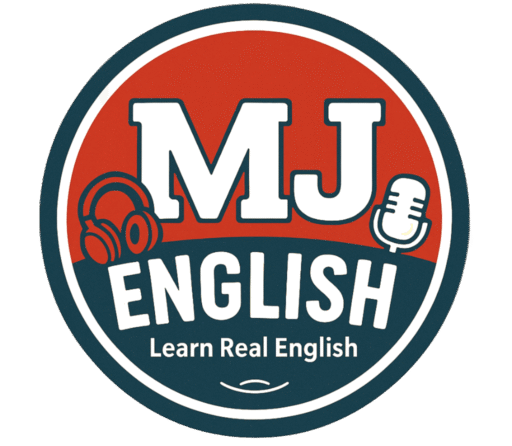Eric 和 Mia 的初次相遇,學會美式英語中的自然寒暄與職場聊天技巧:
✅ 自然介紹自己、不尷尬的開場白
✅ 3 種問「你做什麼工作」的說法
✅ 怎麼回應對方職業才不句點
Getting to Know You
👥 認識新朋友聊聊工作
Eric and Mia are chatting at a community event.
Eric 和 Mia 在社區活動中聊天認識彼此。
Dialogue 對話
(Eric = E;Mia = M)
E: Hi, I don’t think we’ve met before. I’m Eric.
M: Nice to meet you, Eric! I’m Mia.
E: So, what do you do for a living?
M: I’m a graphic designer. I work from home most days.
E: That’s cool! Do you enjoy it?
M: Definitely. I love being creative. What about you?
E: I’m a flight attendant. I travel a lot for work.
M: Wow, that sounds exciting! Is it tiring?
E: Sometimes, especially on long flights. But I enjoy meeting people.
M: I bet! You must have lots of stories.
E: Oh yes—some funny, some weird!
M: Well, I hope we get to chat again soon.
E: Me too. Maybe next time you can show me your designs!
🔑 Vocabulary 重點單字
met [met] v. 遇見(meet 的過去式)
We’ve never met before.
我們以前沒見過面。
graphic designer [ˈɡræfɪk dɪˌzaɪnər] n. 平面設計師
She works as a graphic designer.
她是平面設計師。
flight attendant [flaɪt əˈtendənt] n. 空服員
He’s been a flight attendant for five years.
他當空服員已經五年了。
creative [kriˈeɪtɪv] adj. 有創造力的
You need to be creative for that job.
那份工作需要創造力。
tiring [ˈtaɪərɪŋ] adj. 令人疲累的
Long flights can be tiring.
長途飛行很累人。
💬 Learning Focus 語句焦點
I don’t think we’ve met before.
我們應該沒見過吧。
⭢ 用來禮貌地開啟對話。
What do you do for a living?
你是做什麼工作的?
⭢ 用於初次認識時問職業。
That sounds…
聽起來…
⭢ That sounds exciting!
聽起來好刺激!
J: Hello everyone, and welcome to MJ ENGLISH!
J:大家好,歡迎收聽 MJ ENGLISH!
M: Welcome to our podcast where we help you learn American English in a fun and practical way.
M:我們這個節目會用輕鬆又實用的方式,幫助你學會道地的美式英文。
J: Today we're going to talk about meeting new people and discussing work - something we all do in our daily lives.
J:今天我們要聊的主題是——認識新朋友還有聊工作,這絕對是我們日常生活中最常遇到的事!
M: That's right! We'll be exploring a conversation between Eric and Mia at a community event. But first, let's set the scene for our listeners.
M:沒錯!我們會帶大家聽一段 Eric 和 Mia 在社區活動中初次見面的對話。但在那之前,先幫大家想像一下場景。
J: So imagine you're at a community event - maybe a neighborhood barbecue, a local festival, or even a work networking event. You see someone you don't know, and you want to start a conversation. What do you do?
J:想像一下你正在參加一場社區活動,可能是鄰居辦的烤肉、地方節慶,或是職場的聯誼活動。你看到一個不認識的人,想跟他搭話,你會怎麼做呢?
M: Great question! In American culture, it's totally normal to introduce yourself to strangers at social events. Americans are generally pretty friendly and open to meeting new people.
M:這問題超棒!在美國文化中,在社交場合主動和陌生人打招呼、介紹自己是非常自然的事。美國人通常都滿熱情,也喜歡認識新朋友。
J: Exactly! And one of the most common conversation starters is introducing yourself and asking about someone's job. Now, let's listen to Eric and Mia's conversation.
J:沒錯,而且最常見的開場白就是自我介紹,接著問對方是做什麼的。那我們先來聽聽 Eric 跟 Mia 的對話吧!
Dialogue 對話
(Eric = E;Mia = M)
E: Hi, I don’t think we’ve met before. I’m Eric.
嗨,我想我們之前沒見過。我是 Eric。
M: Nice to meet you, Eric! I’m Mia.
很高興認識你,Eric!我是 Mia。
E: So, what do you do for a living?
那你是做什麼工作的呢?
M: I’m a graphic designer. I work from home most days.
我是平面設計師,大部分時間都在家工作。
E: That’s cool! Do you enjoy it?
好酷喔!你喜歡這份工作嗎?
M: Definitely. I love being creative. What about you?
當然!我超喜歡發揮創意。那你呢?
E: I’m a flight attendant. I travel a lot for work.
我是空服員,工作常常要到處飛。
M: Wow, that sounds exciting! Is it tiring?
哇~聽起來很刺激耶!會不會很累?
E: Sometimes, especially on long flights. But I enjoy meeting people.
有時候會,特別是長途飛行。不過我很喜歡認識新的人。
M: I bet! You must have lots of stories.
我相信!你一定有很多有趣的故事吧~
E: Oh yes—some funny, some weird!
超多!有些好笑,有些超奇怪的!
M: Well, I hope we get to chat again soon.
希望我們很快可以再聊天~
E: Me too. Maybe next time you can show me your designs!
我也這麼想!下次也許你可以給我看看你的設計作品!
M: Alright! So that was Eric and Mia meeting for the first time. Did you catch everything? Don't worry if you didn't - we're going to break it down step by step.
M:好~剛剛你聽到的就是他們第一次見面的對話。有聽懂嗎?沒關係,我們等等會一步一步幫你拆解說明。
J: Let's start with the opening. Eric says, "Hi, I don't think we've met before. I'm Eric." This is a perfect way to introduce yourself to someone new.
J:我們從開場開始講。Eric 說:「嗨,我們好像沒見過,我是 Eric。」這句是認識新朋友時,最自然的開場方式之一。
M: Notice how polite and friendly this sounds. He's not just saying "Hi, I'm Eric." He's acknowledging that they haven't met before, which makes the introduction feel more natural.
M:你有發現嗎?他不是直接說「嗨,我是 Eric」,而是加了一句「我們應該沒見過吧?」這樣聽起來更客氣,也比較有禮貌。
J: The key phrase here is "I don't think we've met before." This is super useful because it's a gentle way to start a conversation. You're not assuming anything - you're just opening the door for introductions.
J:重點句型是「我想我們以前沒見過」,這是一個很溫和的開場方式,不會讓人有壓力,也自然開啟一段對話。
M: And then Mia responds with "Nice to meet you, Eric! I'm Mia." This is the standard, polite response. In American English, we always say "Nice to meet you" when meeting someone for the first time.
M:然後 Mia 回說:「很高興認識你,Eric,我是 Mia。」這是最基本也最禮貌的回答方式,美國人在第一次見面時幾乎都會這樣說。
J: Now, here's something important for our Taiwanese listeners. In Chinese culture, you might be more indirect when asking about someone's job. But in American culture, it's totally normal and expected to ask about work early in a conversation.
J:這裡有個提醒給台灣聽眾。在中文文化裡,我們可能比較不會一開始就問工作,但在美式對話中,一開頭聊工作是很自然的事。
M: Exactly! Eric asks, "So, what do you do for a living?" This is probably the most common way to ask about someone's job in casual conversation.
M:對!Eric 問:「那你是做什麼工作的?」這句是最常見、最自然的問工作句型。
J: There are other ways to ask this too. You could say "What do you do?" or "What's your job?" But "What do you do for a living?" is very natural and common.
J:當然也可以說 "What do you do?" 或是 "What's your job?",但 “What do you do for a living?” 聽起來比較自然、有禮貌。
M: Mia answers, "I'm a graphic designer. I work from home most days." Notice how she gives a little extra information - she doesn't just say her job title, she adds that she works from home.
M:Mia 回答:「我是平面設計師,我大部分時間都在家工作。」她不只是講工作名稱,還補充了工作方式,這就是好對話的技巧!
J: This is great conversation technique! When someone asks about your job, don't just give a one-word answer. Add a little detail to keep the conversation going.
J:這是很棒的對話技巧喔~如果有人問你工作,千萬別只講職稱,加一點細節,聊天才會繼續下去。
M: Then Eric shows interest by saying "That's cool! Do you enjoy it?" This is perfect! He's not just moving on to the next topic - he's showing genuine interest in what she does.
M:接著 Eric 回應:「好酷喔!你喜歡這份工作嗎?」他不是隨便接一句,而是真心對 Mia 的工作感興趣。
J: And notice his word choice - "That's cool!" This is very American. We use "cool" all the time to show that we think something is interesting or impressive.
J:你有發現他用的「cool」嗎?這是超級美式的用法,表示「很棒」「很酷」「很不錯」的意思,美國人超常講!
M: Mia responds with "Definitely. I love being creative." Again, she's giving a reason WHY she enjoys her job, not just saying "yes."
M:Mia 回答:「當然喜歡,我喜歡發揮創意的感覺。」她不是只說「喜歡」,還補充了喜歡的原因,對話更有深度。
M: Then she turns the question back to Eric with "What about you?" This is super important in American conversation - it should be a two-way exchange.
M:然後她問:「那你呢?」這句很重要!美式對話強調雙向互動,不能只講自己的。
J: Eric says, "I'm a flight attendant. I travel a lot for work." Again, he's giving that extra detail about traveling.
J:Eric 回說:「我是空服員,工作常常要出差飛來飛去。」這句也一樣,有補充資訊,讓對話更豐富。
M: And Mia's response is perfect - "Wow, that sounds exciting! Is it tiring?" She's showing enthusiasm and asking a follow-up question.
M:Mia 的回應也很棒:「哇~聽起來好刺激喔!會不會很累啊?」她有表示興趣,還順勢追問。
J: The phrase "That sounds…" is really useful. You can say "That sounds exciting," "That sounds difficult," "That sounds interesting" - it's a great way to respond to what someone tells you.
J:「That sounds…」這個句型超實用,可以接 exciting(刺激)、difficult(困難)、interesting(有趣)等等,是很常見的回應方式。
M: Eric gives a balanced answer - "Sometimes, especially on long flights. But I enjoy meeting people."
M:Eric 給了一個很平衡的回答:「有時候會啦,特別是長程航班。不過我很喜歡認識新朋友。」
J:And he being honest about the challenges but also highlighting what he likes about his job.
J:他一方面誠實地講出這份工作的挑戰,同時也強調了自己喜歡這份工作的地方。
M: Then Mia says "I bet! You must have lots of stories." The phrase "I bet" is like saying "I'm sure" or "I can imagine." It's very conversational.
M:接著 Mia 說:「我敢說!你一定有很多故事吧~」這裡的 “I bet” 就像我們中文會說「我猜你一定…」或「我可以想像」,是一個很口語、很生活化的表達。
J: And Eric confirms with "Oh yes—some funny, some weird!" He's being friendly and engaging, which encourages more conversation.
J:然後 Eric 回:「真的啊~有些很好笑,有些超怪的!」這種輕鬆、有趣的回應方式讓對話更自然,也會讓人想繼續聊下去。
M: Finally, they wrap up with Mia saying "Well, I hope we get to chat again soon" and Eric responding "Me too. Maybe next time you can show me your designs!"
M:最後他們的結尾也很自然,Mia 說:「希望我們很快可以再聊聊~」Eric 回:「我也是!下次妳可以給我看看妳的設計!」
J: This ending is perfect because they're both expressing interest in continuing the friendship and Eric is referencing something specific from their conversation.
J:這樣的結尾很棒,因為雙方都表達了希望繼續認識的意願,而且 Eric 還呼應了剛剛 Mia 說的內容,讓人感覺用心。
M: Now let's go through some key vocabulary from this conversation. First up is "met" - that's the past tense of "meet."
M:接下來我們來複習一下今天對話中出現的重要單字。第一個是「met」,是「meet(見面)」的過去式。
J: Right, so "We've never met before". This is present perfect tense, which we use for experiences that happened at some unspecified time in the past.
J:沒錯,「We’ve never met before」意思是「我們之前從未見過面」,這是現在完成式,用來表示過去某個不特定時間的經驗。
M: Next is "graphic designer." This is someone who creates visual designs for things like websites, advertisements, logos, and so on.
M:接下來是「graphic designer(平面設計師)」,這是指負責做網站、廣告、Logo 等視覺設計的人。
J: Then we have "flight attendant." This used to be called "stewardess" for women and "steward" for men, but now we use "flight attendant" for everyone.
J:再來是「flight attendant(空服員)」,以前女生叫 stewardess、男生叫 steward,但現在都統一說 flight attendant,不分性別。
M: "Creative" is an adjective meaning having the ability to create original ideas or artistic works. If you're creative, you're good at coming up with new ideas.
M:「creative(有創意的)」是形容詞,指一個人有創造力、能想出新的點子,或擅長藝術創作。
J: And "tiring" means something that makes you tired. Don't confuse this with "tired" - "tiring" describes something that CAUSES tiredness.
J:「tiring(令人疲憊的)」意思是「會讓人累的」,不要跟「tired(感到累)」搞混喔!tiring 是讓人累的原因,tired 是累的結果。
M: Great point! So you might say "Running a marathon is tiring" but "I am tired after running a marathon."
M:這個差別很重要!你會說「跑馬拉松真的很累人(tiring)」,但說「我跑完馬拉松好累(tired)」。
J: Now let's talk about some key phrases you can use in your own conversations. First: "I don't think we've met before." This is your go-to introduction line.
J:再來介紹幾個可以馬上用在自己對話裡的關鍵句型。第一句:「I don’t think we’ve met before.(我想我們以前沒見過)」,是非常實用的自我介紹開場白。
M: Second: "What do you do for a living?" This is the most natural way to ask about someone's job in American English.
M:第二句是:「What do you do for a living?(你是做什麼工作的?)」這是美式英文裡最自然問職業的說法。
J: And third: "That sounds…" followed by an adjective. This is perfect for responding to what someone tells you about their job or life.
J:第三句是:「That sounds…」加上一個形容詞,比如「That sounds fun!(聽起來好好玩!)」很適合用來回應對方分享的事情。
M: Remember, Americans love small talk, especially about work. Don't be afraid to ask follow-up questions and show genuine interest in what people do.
M:記住,美國人很喜歡聊天,尤其是關於工作這類的話題。所以不要害怕多問問題,表現出你對對方說的事情真的有興趣。
J: One more tip for our Taiwanese listeners - in American culture, it's okay to ask about salary ranges or job satisfaction, but usually not in the first conversation. Start with these basic questions first.
J:還有一個小提醒給台灣聽眾:在美國文化裡,問薪資範圍或工作滿不滿意是可以的,但通常不會在第一次見面就問,還是先從基本的問題聊起就好。
J: That's all for today's episode of MJ ENGLISH. Thanks for listening!
J:今天的 MJ ENGLISH 就到這邊,謝謝大家的收聽!
M: Keep practicing these phrases, and we'll see you next time! Goodbye!
M:記得多多練習這些句子,我們下次見!掰掰~
J: Bye everyone!
J:大家掰掰!



